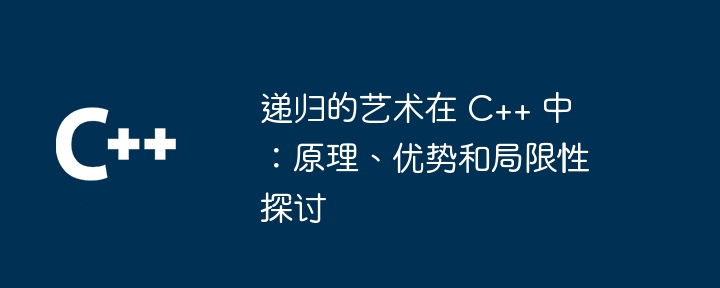
Recursion is a programming technique in which a function calls itself, allowing complex problems to be decomposed into smaller sub-problems. Its advantages include concise and elegant code, and is suitable for handling complex problems, but its disadvantages are that it may lead to stack overflow, low efficiency and difficulty in debugging.

The Art of Recursion in C: Principles, Advantages and Limitations
Principles
Recursion is a programming technique in which a function calls itself. It allows us to solve complex problems that can be solved by breaking them into smaller, similar sub-problems.
Advantages
Recursion provides many advantages, including:
Limitations
However, recursion also has some limitations:
##Practical case: factorial calculation
The following C code is an example of a recursive function that calculates factorial:int factorial(int n) {
if (n == 0) {
return 1;
} else {
return n * factorial(n - 1);
}
}factorial() function calls itself to calculate the factorial of n. If n is 0, the function returns 1. Otherwise, the function multiplies n by the result of a recursive call to factorial(n - 1).
Other examples
There are many other applications of recursion, such as:Conclusion
Recursion is a powerful programming technique that can solve a wide range of problems. By understanding its principles and advantages as well as limitations, we can effectively use it to write efficient and efficient code.The above is the detailed content of The art of recursion in C++: An exploration of principles, advantages, and limitations. For more information, please follow other related articles on the PHP Chinese website!
 How to solve Java stack overflow exception
How to solve Java stack overflow exception
 What are the differences between c++ and c language
What are the differences between c++ and c language
 Recommended learning order for c++ and python
Recommended learning order for c++ and python
 Cost-effectiveness analysis of learning python and c++
Cost-effectiveness analysis of learning python and c++
 Is c language the same as c++?
Is c language the same as c++?
 Which is better to learn first, c language or c++?
Which is better to learn first, c language or c++?
 The difference and connection between c language and c++
The difference and connection between c language and c++
 C++ software Chinese change tutorial
C++ software Chinese change tutorial




